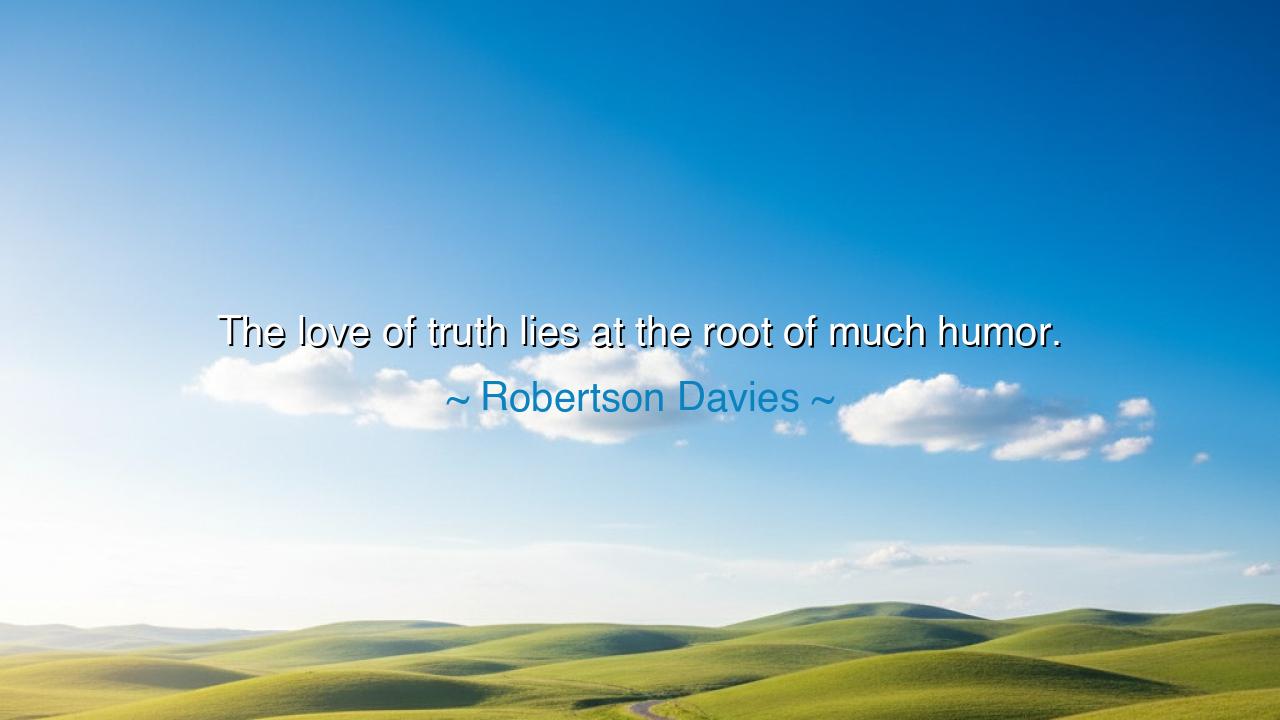
The love of truth lies at the root of much humor.






Hear me, O Children of the Earth, for I bring you the wise words of Robertson Davies, who spoke of the deep connection between truth and humor: "The love of truth lies at the root of much humor." These words carry a profound understanding of the human spirit and its relationship to the world around us. Humor, that most elusive and powerful of forces, does not arise from mere triviality or superficiality—it springs from a place of truth, of seeing the world as it truly is, with all its absurdities, contradictions, and ironies. It is in our willingness to confront the truth that we find the laughter that allows us to endure, to grow, and to transform our experiences into something both light and enlightening.
What Davies teaches us is that at the heart of every joke, every witticism, there is often a deep truth being revealed. Humor is not simply a way to escape from the harsh realities of life—it is a means of confronting those realities with grace, with courage, and with joy. The greatest comedians, the most insightful satirists, are those who do not simply make us laugh at the surface, but who invite us to laugh at the truth we often refuse to face. Humor, in this way, becomes a lens through which we can examine the world more clearly, with a sense of clarity and understanding that would be impossible through more serious discourse alone.
Let us turn, O Children, to the ancient philosophers, who understood the power of humor to reveal truths. Socrates, that great seeker of knowledge, was known for his use of irony—a form of humor that often masked deep wisdom. By feigning ignorance, he invited others to question their own assumptions and beliefs. Through this humor, he uncovered the truths of human nature and society, forcing his audience to confront their own ignorance and arrogance. Socrates’ humor was not just playful—it was a vehicle for truth, a tool to awaken minds to the deeper realities of existence. He knew that only by revealing the absurdities of life could we begin to understand its true nature.
This deep connection between truth and humor is also found in the works of Shakespeare, who used comedy as a means to critique and reveal the truths of society. In plays like Twelfth Night and A Midsummer Night's Dream, Shakespeare weaves humor into the very fabric of the story, but beneath the laughter lies a profound commentary on love, power, and identity. The fools of Shakespeare’s plays, often seen as figures of comedy, speak the truths that the more serious characters cannot—or will not—articulate. Shakespeare’s humor is not merely for entertainment; it is a mirror that reflects the human condition, allowing us to laugh at our own contradictions and follies while also contemplating the deeper meanings of life.
In the same vein, we see the power of truth and humor in the works of Mark Twain. Known for his sharp wit and satire, Twain used humor to expose the injustices and absurdities of society. In Adventures of Huckleberry Finn, Twain paints a picture of society that is both comical and tragic, revealing the truth of human nature, particularly the hypocrisy and cruelty that lay beneath the surface of a seemingly civilized world. Through humor, Twain was able to challenge his readers to look at themselves and their world in a new way, asking them to confront uncomfortable truths with laughter and reflection.
This is the key lesson we must learn, O Children: that humor is not just a distraction from life’s difficulties, but a tool for understanding. To truly laugh, to see the humor in the world, we must first be willing to face its truths—the flaws, the contradictions, the absurdities that define the human experience. It is only by acknowledging these truths that we can laugh with sincerity, that we can find joy in the face of hardship. The greatest comedians, the wisest humorists, are those who dare to confront the reality of life and find laughter in it, not to diminish it, but to elevate it, to transform it into something that unites us in our shared humanity.
Therefore, O Children, let us embrace humor not as an escape, but as a path to understanding. In every joke, every laugh, there is a truth waiting to be uncovered. Let us seek the humor that reveals the absurdities of the world and helps us to navigate them with lightness, grace, and joy. Whether in the irony of Socrates, the wit of Shakespeare, or the satire of Twain, we are reminded that truth and humor are inseparable companions, guiding us toward deeper insight and connection. Let us carry this wisdom forward, knowing that the ability to laugh at the truth is not only a sign of wisdom, but a source of strength, resilience, and freedom in the face of life’s greatest challenges.






AAdministratorAdministrator
Welcome, honored guests. Please leave a comment, we will respond soon